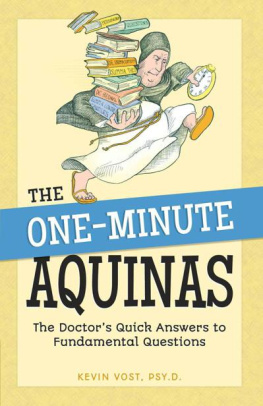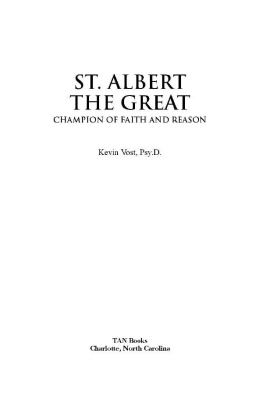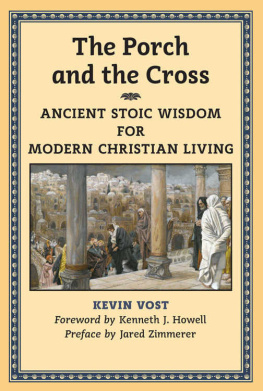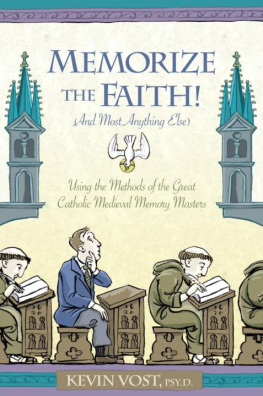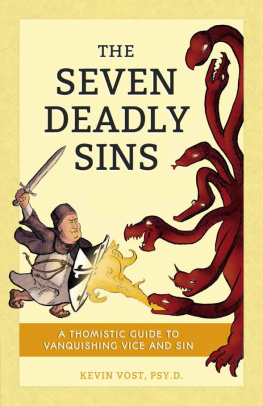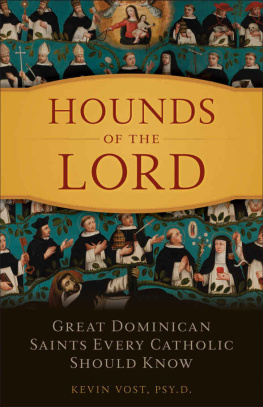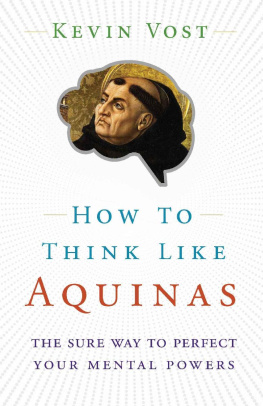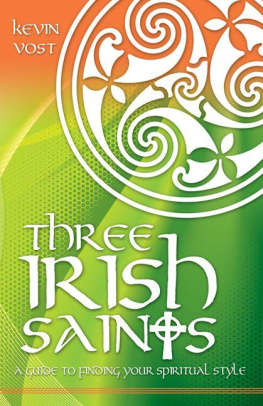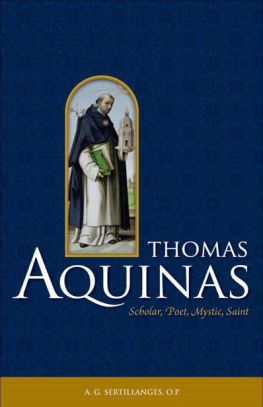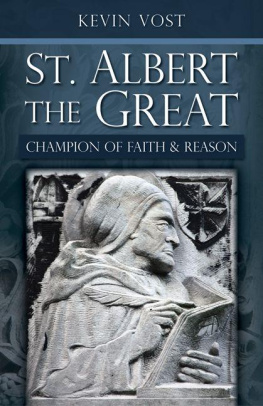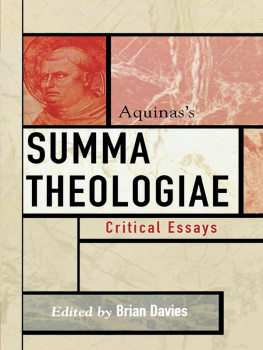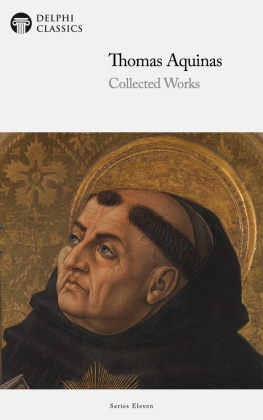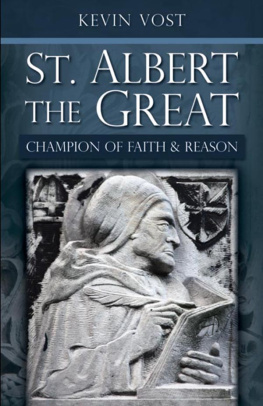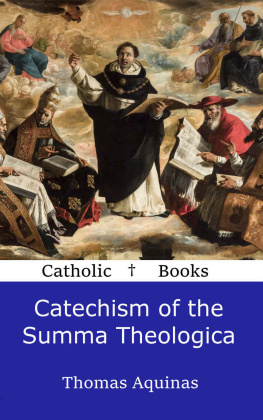KEVIN VOST
The One-Minute
AQUINAS
THE DOCTORS QUICK ANSWERS
TO FUNDAMENTAL QUESTIONS
SOPHIA INSTITUTE PRESS
Manchester, New Hampshire
Other books by Kevin Vost
from Sophia Institute Press:
Memorize the Faith!
Unearthing Your Ten Talents
Fit for Eternal Life!
Copyright 2014 Kevin Vost
Printed in the United States of America
All rights reserved
Cover art by John Folley
Cover design by Carolyn McKinney
Except where otherwise noted, biblical references in this book are taken from the Douay-Rheims edition of the Old and New Testaments. References followed by RSV are taken from the Revised Standard Version of the Bible, copyright 1952 (2nd edition, 1971) by the Division of Christian Education of the National Council of the Churches of Christ in the United States of America. Used by permission. All rights reserved.
No part of this book may be reproduced, stored in a retrieval system, or transmitted in any form, or by any means, electronic, mechanical, photocopying, or otherwise, without the prior written permission of the publisher, except by a reviewer, who may quote brief passages in a review.
Sophia Institute Press
Box 5284, Manchester, NH 03108
1-800-888-9344
www.SophiaInstitute.com
Sophia Institute Press is a registered trademark of Sophia Institute.
Library of Congress Cataloging-in-Publication Data
Vost, Kevin.
The one-minute Aquinas : the doctors quick answers to fundamental questions, St. Thomas Aquinas / Kevin Vost.
pages cm
Includes bibliographical references.
ISBN 978-1-622821-58-7 (pbk. : alk. paper) eBook ISBN 978-1-622821-59-4
1. Thomas, Aquinas, Saint, 1225?-1274. Summa theologica. I. Title.
BX1749.T6V67 2014
230.2 dc23
2013040127
To Sisters Matthew Marie Cummings, Elizabeth
Anne Allen, and Mary Anne Zuberbueler, O.P.,
the Dominican Sisters of St. Cecilia,
and the faculty, staff, and students
of Aquinas College in Nashville, Tennessee,
for the glorious way that you share
the fruits of your contemplation.
Because he had the utmost reverence for the Doctors of antiquity, he seems to have inherited in a way the intellect of all.
Pope Leo XIII, Aeterni Patris
He could have discovered philosophy anew, if it had been destroyed by fire. He could have restored it in a better way: his knowledge entitled him to fame, greater even than that of the ancients.
Henry of Wurzberg, poet
St. Thomas cast his net upon the universe and carried off all things, transformed into the life of the mind, towards the beatific vision.
Jacques Maritain, St. Thomas Aquinas
Contents
Part I
Part II
Part III
Preface
The worlds smartest man?
Who is the worlds smartest man? This is not the worlds easiest question to answer. Its not like trying to find the worlds strongest man, where you can gather enormous barbells, boulders, trucks, and the like to see who can lift, heave, and pull them the best. And besides, I dont just mean the smartest man alive today , but the smartest person of all time .
How about Albert Einstein? Its not every day that some guy figures out that E = mc (whatever exactly that means). Many say Einstein did Sir Isaac Newton (the father of the three Laws of Motion) one better when it came to grasping the mysteries of the physical universe.
Then theres Aristotle, the Father of Logic. When modern social scientist Charles Murray wrote his book Human Accomplishment, comparing the most influential thinkers in science, philosophy, literature, and art, this fellow from ancient Greece was the all-time, all-around MVP, and easily number one in philosophy. In addition, Murray ranks Aristotle second only to Charles Darwin in the field of biology. Indeed, when Darwin read Aristotle for the first time, he wrote that, although Linnaeus and Cuvier had been his gods, he found they were mere schoolboys to old Aristotle.
Theres another candidate all lovers of science should know. He was one of the most prolific writers of all time, the most famous German professor of his day a veritable one-man walking encyclopedia who wrote on every topic from A (as in anatomy, anthropology, and astronomy) to Z (zoology). He was such a towering mind that he was called Magnus (the Great) while he still lived. He is the patron saint of scientists and scholars St. Albert the Great (11931280). But Albert the Great had a hero he considered much greater than himself. That hero was so brilliant that when Albert read the mans crowning masterpiece, he ceased writing himself, explaining that his heros work could not be equaled or surpassed. Who was the hero? St. Alberts own former student, St. Thomas Aquinas (12251274). When Thomas died at the age of forty-nine, St. Albert bemoaned the loss of the flower and glory of the world.
Its St. Thomas Aquinas who I (and many others) believe is the smartest human being God ever graced to walk upon the earth.
Who says St. Thomas is smart?
Not that St. Thomas himself claimed to be a genius. In the first book of his masterful Summa Contra Gentiles, he apologized to his readers that in attempting the work, he might be exceeding his limited powers, but he embarked nonetheless with confidence in the name of divine Mercy.
But since St. Thomass passing on March 7, 1274, more than seven hundred years of popes, scholars, and saints have agreed that his wisdom and powers, rather than being limited, were so extraordinary that he is called the Angelic Doctor.
Atheistic philosophers, including the Objectivist followers of Ayn Rand, acknowledge St. Thomass towering achievements in the field of reason and in reviving and disseminating the works of Aristotle. Charles Murray, an agnostic, lists St. Thomas among the giants of western philosophy, ranking him the sixth most influential of all time above Socrates and St. Augustine. Note that philosophy was not Thomass specialty, but merely a tool a handmaiden to theology, the highest of all branches of learning.
Thomas makes this crystal clear: To use the words of [St.] Hilary: I am aware that I owe this to God as the chief duty of my life: that my every word and sense may speak of Him.
When groups of modern psychologists have been polled on the most defining characteristic of superior human intelligence, time and again the winner is the capacity for abstract reasoning. Thats the ability to see the concrete things and events in the world and to grasp their underlying causes and principles; and also to go the other way: to grasp the fundamental, universal principles of reality and apply them to particular things and events.
That gift was St. Thomass strong suit and was crucial to his massive contribution to civilization which was to teach us how to reason in Gods world and find our way to real wisdom. As Thomas himself put it: Experience shows that some understand more profoundly than do others; as one who carries a conclusion to its first principles and ultimate causes understands it better than one who reduces it to its proximate causes. As we will see in Part I of this book, St. Thomas even explains for us just how abstract reasoning works. He devoted the full power of his intellect, throughout his whole life, to the highest, most important, and fundamental cause. As he will tell us in Part II of this book: And this we call God.
The peoples genius
But note well, Thomas was anything but an egghead or a modern academic with his head in the clouds, writing only for other professors and university students. As a spiritual son of St. Dominic and member of his Order of Friars Preachers, Thomas used also his great intellectual gifts to explain Christs gospel message to the minds and hearts of ordinary lay folk. As a young man, after receiving Holy Orders in Cologne, his sermons in the German vernacular (rather than in Latin) drew enormous crowds. In the last year of his life, he preached a series of sermons in the Neapolitan dialect at the church of San Domenico in Naples that, according to early biographers, drew almost the whole population of Naples, and indeed, he was heard by the people with such reverence that it was as if his preaching came forth from God. St. Thomas, then, was a man of thought, a man of God, and a man of the common people.
Next page
